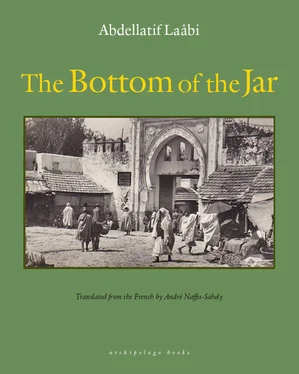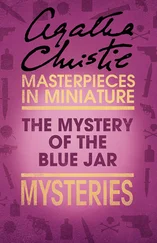Was Touissa mixed up in all that? It was all well and good for those with full choukaras , for whom such extravagances were only a trifle. But how could Touissa, who was poorer than Job, afford it?
Another mystery surrounding this good-natured man was his eternal bachelorhood, which at his age — he was well into his thirties — stood out as an anomaly. Hence the stories about him circulating in the family. Though only God is all-knowing, it seemed Touissa had disappeared from Fez for more than a year. Some eyewitness accounts placed him in Marrakech, where he had gotten married and even fathered a child. Then one day he’d reappeared, empty-handed, filthy, dressed in rags, and infested with lice. When pressed on the subject of his adventures, he made out as if he hadn’t understood the question. Whenever someone wanted to extract some detail or other, Abdelkader broke out in hysterical laughter as if he’d just been tickled — he was extremely sensitive to tickling, and knowing his weak point, the children took great pleasure in exploiting it. Basically there was no pinning him down on the subject.
Afterward Abdelkader continued to run away, but for shorter periods at a time. He always came back in the same sorry state, at which point Ghita would look after him as if he were one of her children. She’d clean him up, clothe him, and let him stay at the house until he got on his feet and was ready to go back to work.
Touissa’s activities were yet another bizarre facet of his character. Unlike his two brothers, he hadn’t followed in his ancestors’ footsteps and become a saddlemaker, a trade that had been passed down from father to son for many generations. Instead, after who knows what byway, he had taken up the craft of making slippers. A profession he only practiced in an amateurish way since at any given time this champion of laziness contented himself with a small presence in the Sekkatine souk, and in exchange for some services, his brothers looked after his basic needs. Yet not strictly all of his needs, since our man had a penchant for smoking kif. In order to procure it, he was obliged to take up irregular employment at a workshop in the Bine Lemdoune neighborhood. Namouss had seen him there once or twice. Now and again, Touissa would set himself hard at work in that tiny dark hole that he shared with a number of other craftsmen. While he was completely deaf, he must have had eyes like a hawk in order to be able to sew by hand in such conditions, and he did so with such skill and dexterity that his babouches were put on sale even in the Sebbat souk, where I can assure you such fine workmanship was held in extremely high regard by the shopkeepers. On another occasion, Namouss had come across him absorbed in a ceremony that he had elevated into an art: the preparation of the kif. Touissa would put a bunch of the herb on a plank he’d placed level on the floor. He would pluck the leaves from the stalks one by one and throw out the seeds. A little mound would begin to pile up, which Touissa then would take to with an extremely sharp knife, chopping up the leaves and reducing them to tiny pieces, at which point he’d sprinkle a small quantity of tobacco on it. After which comes the fine-tuning as he’d sift the mix and eliminate the chaff. The finished product is then poured into a leather tobacco pouch, at which point the tasting begins. Touissa would fill up the bowl of his sebsi pipe, light it, and close his eyes, drawing in a deep lungful. Then he passed the pipe along to his nearest colleague, who would take a drag and pass it on to the next. The experiment seemed conclusive since the man who must have been the master craftsman sent an apprentice out to the café to fetch some tea. But Namouss couldn’t hold on for much longer. The smell of the kif mixed with the odor of the chemicals used to treat the products in the workshop was making his head spin. With a few hand gestures, he made clear he had to leave. Happy that Namouss had come to see him, Touissa pulled out a coin that shone in his hand.
“Take it,” he said, “and give my regards to the lady of the house.”
Uncle Abdelkader was the subject of so many stories. The latest, for instance — just to send a smile his way, where he now lies next to his brothers in the Bab Guissa cemetery — occurred when Uncle Si Mohammed’s family was celebrating a great occasion, to which Namouss’s family had been invited. After the meal, the help began to fidget in a most unusual way before being overwhelmed by an outbreak of hysterical laughter. Touissa, who started chuckling as soon as he was addressed, began rolling on the floor and almost chocked on his own giggles. He was forced to leave the house so he could calm down and catch his breath. As the night wore on, he had yet to return to the house. Everyone came to the conclusion that he had left for good and the gates of the house were shut. In the meantime, the mystery of the mad laughter had been solved. Namouss’s aunt, who was rather stuck-up, had chosen that night to reveal an unexpected character trait: her mischievousness. She had put some maâjoun , a powerful stimulant, in the food in order to — in her words — make the monkeys sing and laugh. Well, well, the prank provoked mixed responses from the monkeys. But what worried them the most was what had happened to Touissa. Where might he have wound up in his condition? The following morning, the whole affair came to a happy — and quite comical — conclusion. When the gates were opened, Touissa was found fast asleep on the threshold. . with a large watermelon under his head. Why a watermelon, and how had he gotten his hands on one at such a late hour of the night? A small wonder that was added to the list of other larger wonders.
Ah, Touissa! The day he died, the family realized he didn’t have any identity papers on him, which meant a burial permit couldn’t be secured. Twelve witnesses were found to attest that the corpse that was to be put into the ground was in fact that of Abdelkader, the son of Haji Abdeslam bin Hammad Laâbi Rashidi and of Fatima bint Abderrahmane Shaqshaq, who it was presumed had been born in Fez in 1915.
This was how Abdelkader’s story came to an end. Touissa’s story, however, continues on.
TOUISSA HANDED OUT the presents he’d brought with him: jabane (nougat), sesame cake, dates, and walnuts for the children, and a yellow scarf for Ghita.
This time around, he had gotten back on his feet and was looking healthy and respectable. Namouss was struck by yet another detail: He was wearing shoes. In fact, he had always worn shoes, but it was the first time that Namouss had noticed them, amused by how paradoxical this was considering that Touissa made slippers. As one remark led to another, Namouss noticed that unlike his brothers — and here again there was nothing new — Touissa dressed in the European fashion. Trousers, a shirt, and over his shirt, even during the summer, a black overcoat that hung down to his ankles like a djellaba. People of Touissa’s ilk didn’t bother themselves about dressing elegantly, traditional clothes had become too onerous. They therefore made recourse to the American surplus stalls in Boujeloud’s Joutiya. In this flea market, which Namouss was well acquainted with, one rummaged through piles of clothes and usually found something you could be pleased with, and for a modest sum. This brings us to yet another bizarre enigma surrounding Touissa.
We celebrated the return of our prodigal uncle. The children were fascinated by his bohemian side. They could poke fun at him, outrageously so at times, without the threat of reprisals. Zhor, the eldest sister, took the initiative since she was better equipped to converse with Touissa. She’d learned the sign language used by the deaf and put it to wonderful use. One habitual game consisted in taking advantage of Touissa’s culinary phobias, since he was terrified of honey and okra. Zhor would therefore pretend to dip her index finger in a pot of honey and then place it in her mouth, accompanying the motion with a sucking sound while feigning delight. Even though she was only pretending, Touissa would begin shaking in fear. But Zhor would stay on the offensive. Pulling her finger out of her mouth, she would slap her forehead with the palm of her hand shouting: “Honey! Honey!” Touissa would then stamp his feet and shake even more, and attempt to escape. The children would then surround him and start to tickle him relentlessly, right up to the point where they feared he might start to suffocate. Giving him a little room to breathe and recover, they would then renew their assault, this time armed with okra. L-mloukhiya !
Читать дальше












